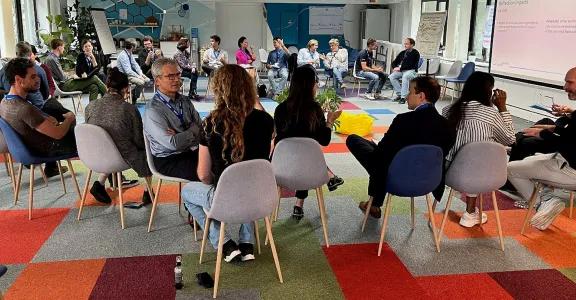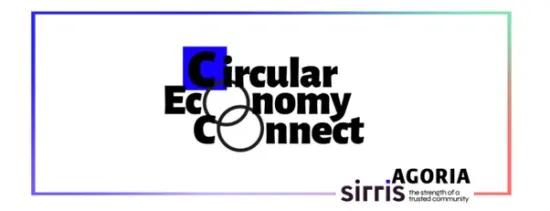Success analysis at kick-off Learning Network CE Connect 2023
The CE Connect Learning Network, organised by Sirris and Agoria, has been bringing like-minded people together for years to discuss and learn about the circular economy. During the recent kick-off of the new cycle, we conducted a success analysis: what steps do companies think will actually get them closer to the circular economy? An overview of what this exercise came up with.
We cannot predict the future. The starting point is therefore that no one really knows what the circular economy will look like. Despite this, making an idealised image of it means that you at least know what you want to work towards, even though how things will actually look in five to ten years remains guesswork. The greatest certainty we have is that no one knows all the ins and outs of the future circular economy. All this means that we form a growing group of people who know nothing for sure but are curious and want to help build a more circular future.
‘Sharing is caring’
Belonging to a group - and certainly belonging to a group of people with similar challenges - is pleasant and, above all, encouraging. It also helps to give the confidence needed to take further actions. Our CE Connect Learning Network brings such a group of people together and provides the sort of recognition that gives the energy needed to take the next steps. Because all the participants had already taken several steps towards circular entrepreneurship, we once again carried out a success analysis during the kick-off of this cycle.
The idea is very simple. Based on simple questions, we list all the elements that have led to progress, such as: ‘What has already been achieved in your organisation - by yourself, your colleagues or by others - that has contributed to taking steps towards your circular vision.‘
The message is to list, complete and share in groups. Because the list is much longer than last year, we are happy to share it with you.
Keys to success in six domains
To make the whole thing more manageable, we divide it into six 'domains'. How do you read these keys to success? Some sound very general, while others are platitudes or even contradictory. The point is to recognise them in your organisation. For example, you can use these lists to check what each of these elements could mean in your organisation and your situation (product, organisation, market, value chain, etc.).
1. Design and product development:
- Design for repairability and modularity.
- Consider the entire life cycle of the product.
- Start with what is already available.
- Optimise the use of resources in production.
- Gather people from different departments.
- Investigate reuse and repair.
2. Management and leadership:
- Involve top management.
- Form a clear vision and use it as a compass.
- Build on what you have.
- Create governance to guarantee sustainability. Use structures that already work well.
- Obtain management approval and support.
- Inform management about the environmental benefits.
- Find internal sponsors.
- Convince management or persuade them of the benefits and opportunities.
- Anticipate changes and crises.
- Don't let management hold you back. Conduct tests to prove that it is both possible and useful
3. Communication and collaboration:
- Share experiences and learn from other companies.
- Encourage collaboration with stakeholders, advocacy groups and sponsors.
- Promote dynamic and open communication.
- Participate in networking.
- Talk about your vision and be transparent.
- Communicate and discuss with customers.
4. Data and analysis:
- Collect and analyse data.
- Know your customer's expectations.
- Work with available data.
- Learn the entire product lifecycle.
- Acquire data on the fly and enrich your knowledge.
- Build a model for implementation.
- Consider the entire supply chain.
- Be aware of the relevant legislation.
- Look for suppliers with the same or a similar vision.
5. Implementation and operation:
- Start with a ‘simple’ project.
- Start with a proof-of-concept (POC).
- Take a hands-on approach.
- Step beyond your limits.
- Create value for customers.
- Measure your progress.
- Celebrate improvement.
- Start with simple tools.
- Learning by doing.
- Take small steps.
- Identify the best CE approach for each product.
- Correlate environmental and financial KPIs.
- Determine a take-back strategy for products.
- Investigate R-strategies (“Reuse, Repair, Refurbish, Remanufacture, and Recycle”).
- Ensure a positive overall impact on the environment.
- Pick your battles - don't try to do everything at once!
6. Change and culture:
- Be passionate and motivated and build an entrepreneurial culture.
- Believe that it is both possible and necessary.
- Dream big, start small.
- Follow training and build knowledge.
- Start slowly.
- Think about different scenarios and prepare for them.
- Surround yourself with driven people.
Step-by-step
Give advice that also provides a lot of food for thought, but, more importantly, can be a source of inspiration for the next small action. Choose an action that you can take yourself, in the very short term (within a few days, even if it is busy), and that involves someone else. The latter is important for sharing knowledge by eliciting reactions. For example, have a few colleagues read (part of) this list and discuss - next to the coffee machine, for example - what sticks with you the most and what resonates the most. This might result in another small action for each of the colleagues involved.
|





